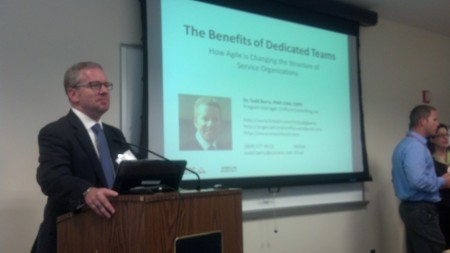We are now in the third week of a government shutdown and if you are a contractor working with the United States government you are probably tired of this madness and wondering when you will be back at work so that you can provide for your family and pay the stack of bills that are piling up. The House has approved a bill that would provide furloughed government employees with 100% of their pay for the time spent, in essence, doing nothing retroactively. But what about government contractors who provide essential government services and without whom government employees could not do their jobs? Well, we are left to fend for ourselves. The majority of us are either burning all of our earned vacation days or we are being furloughed without pay and without the prospect of getting any pay retroactively.
If you are a manager of a team of government contractors have you thought about how you will manage your team once Congress gets their act together and the government reopens? There is sure to be animosity between government contractors and their government employee counterparts. A friend of mine who happens to work for the GSA asked the question “Why would contractors be upset at government employees? They should be upset with Congress!” Be that as it may, we are all humans and human nature will dictate that people who feel wronged will act out against those who are treated differently. As a manager of a team of government contractors, you must be prepared to deal with the aftermath of the shutdown and find creative methods to make your employees feel whole after this disastrous episode with Congress. You must recognize signs of conflict and develop methods to manage the conflict, both direct and passive-aggressive, that may arise due to members of your team feeling relegated and dismissed by your client, the United States government.
I have always believed in a “results oriented work environment” or “ROWE” and after the government reopens and we are all back to work, I am going to double-down on establishing ROWE in my work place. You may be asking “What is ROWE?” A results oriented work environment is where employees are evaluated based on their work and work products and not artificial indicators of their work such as when they arrive at the job site or where they work (onsite or remotely). Managers who embrace ROWE place greater emphasis on the team members’ abilities to get the job done and ensure that the client is 100% satisfied with the work products and solutions delivered and they do not sweat the small stuff like where the work gets done or when it gets done. It is up to the team member to manage their time and work to ensure the work gets done and like self-managing teams, it is the manager’s job to act as a gate keeper to keep obstacles out of the way.
I anticipate that due to the government shutdown that there will be a significant dip in contractor job satisfaction due in part to going weeks with the uncertainty of the shutdown and then suffering the effects of a furlough. Contractors contribute significantly to the success of every government organization and to have Congress dismiss these contributions does not inspire loyalty. Government employees do not carry the weight of public service alone, but yet they are all but assured of receiving a 100% paid vacation while the Democrats and Republicans try to figure out how to govern. Managers of contracting teams should not dismiss the effects this shutdown will have on their teams. It is imperative that managers engage their teams and develop creative ways for combating the negative conflict that will arise when contractors and government employees are back working side-by-side pushing this government forward.




 Posted by Todd
Posted by Todd 

